Duodenal cancer is a little-known cancer that starts in the duodenum.
This is a section of the small intestine shaped like a horseshoe that receives food from the stomach during the process of digestion.
The duodenum uses chemicals and enzymes to break down the food and directs vitamins and nutrients around the body.
Food is then passed to the next section of the small intestine.
Because the duodenum contains a variety of different cells, there are different types of cancer that can develop there such as adenocarcinoma, carcinoid tumours, lymphoma and sarcoma.
Regardless of this, the symptoms of duodenal cancer often affect the digestive system.
However, in its early stages it often doesn’t present with any symptoms.
The Cleveland Clinic explains: “Duodenal cancer is a mass of irregular, fast-growing cells (tumour) in the first portion of your small intestine.
“This tumour may prevent the intestine from properly digesting food and block food from passing through your intestines.
”In early stages, you may have no symptoms of duodenal cancer.
“If the intestinal tumour grows, you may have symptoms that affect your digestive system, such as nausea, constipation or abdominal cramps.”
According to the clinic, there are six symptoms that could signal the disease.
These are:
- Abdominal pain
- Acid reflux
- Blood in your stool
- Constipation
- Nausea or vomiting
- Unexplained weight loss.
If you experience unexplained symptoms you should see your GP.
“In general, the outlook for cancer is better when you detect it in early stages,” the clinic says.
“It can be harder to treat if you find duodenal cancer in later stages.”
WebMD, which describes the cancer as “rare” and “fast-spreading”, also warned of other symptoms that can occur if the disease progresses.
These are:
- Anaemia – it can happen if a tumour starts to bleed into the intestine
- Gastrointestinal obstruction – this happens when a tumour gets so big that it blocks anything from going through the intestine
- Jaundice – when a tumour in the duodenum blocks the bile duct, a bile pigment called bilirubin can build up and turn your skin and the whites of your eyes yellow.
It is not known exactly what causes this cancer but there are a number of things you can do to keep your gut healthy that could lower your risk.
The Cleveland Clinic recommends:
- Eating a diet low in red meats and high in lean protein, fruits, vegetables and whole grains
- Quitting smoking and using tobacco products
- Reducing your alcohol consumption.

